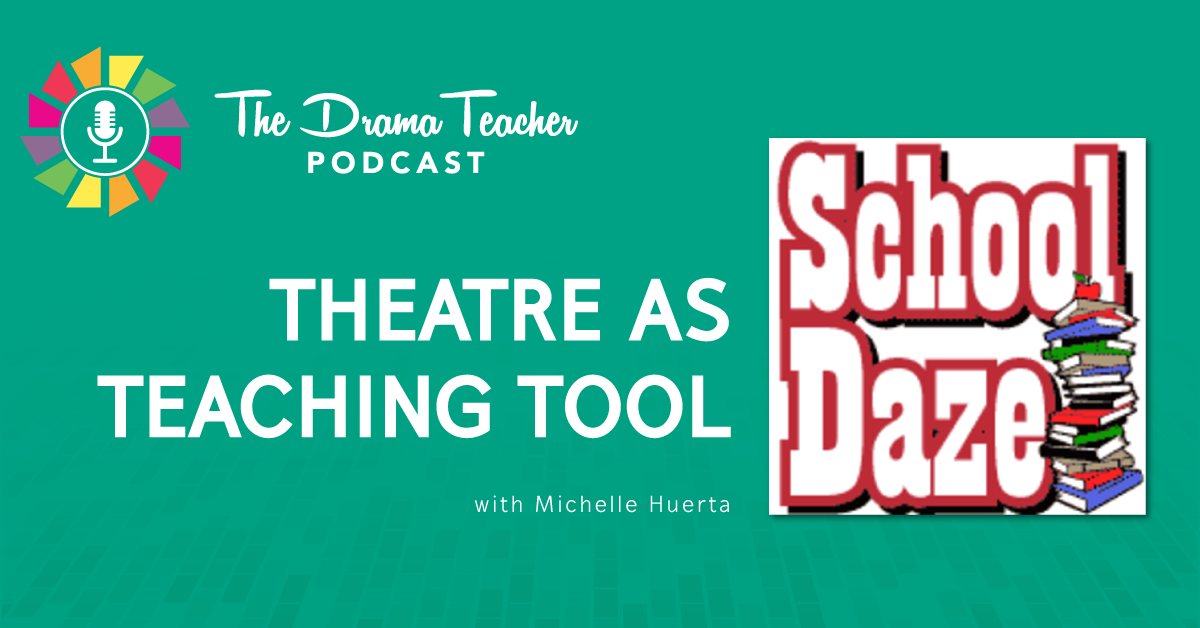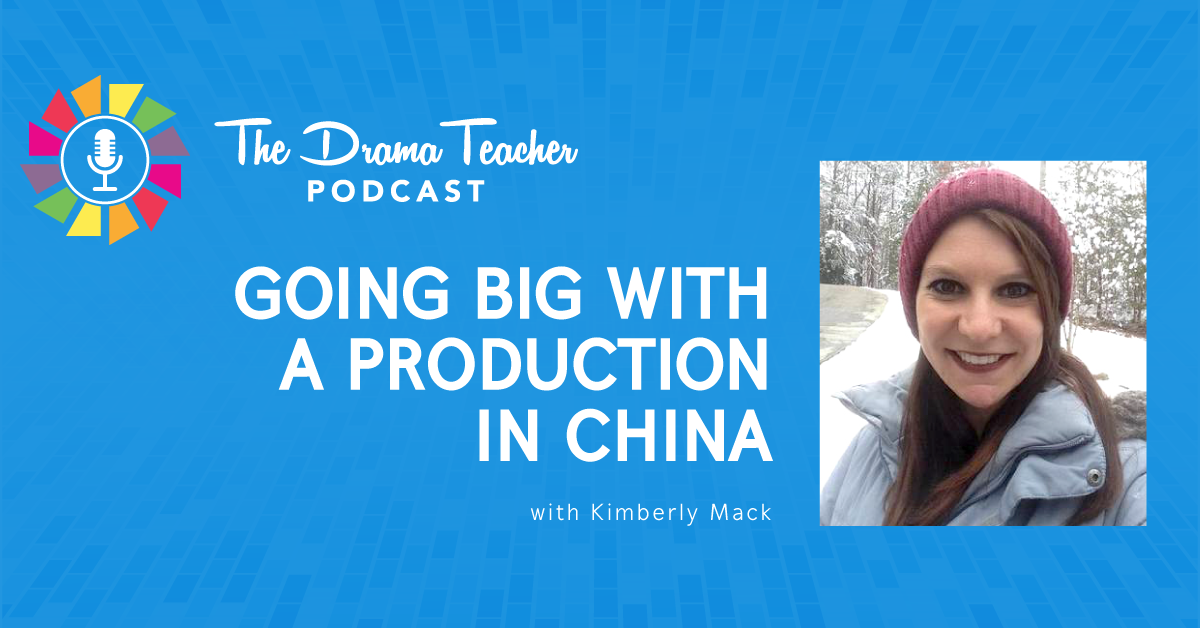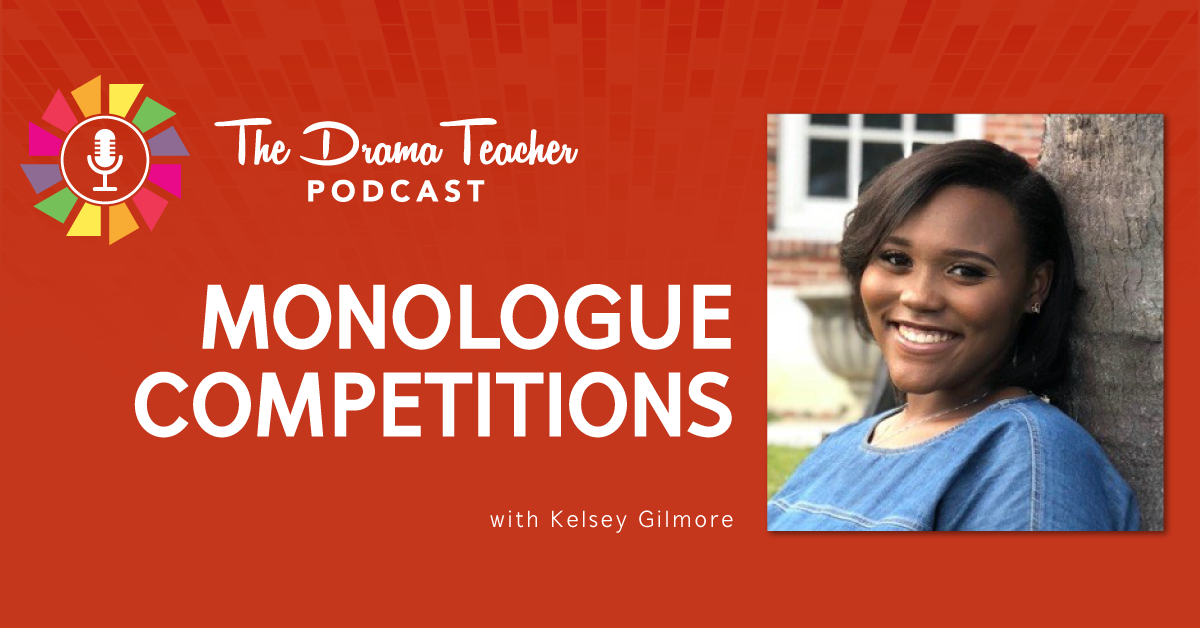Theatre Program Fundraising Idea: Do your own coffee house
Episode 196: Fundraising idea: Do your own coffee house
Listen in for the details of an awesome fundraiser event. Low cost, easy to plan, all you need is a space and your students. You too can fundraise for your program without losing your time or your mind!
Show Notes
Episode Transcript
Welcome to the Drama Teacher Podcast brought to you by Theatrefolk – the Drama Teacher Resource Company.
I’m Lindsay Price.
Hello! I hope you’re well. Thanks for listening!
This is Episode 196 and you can find any links to this episode in the show notes which are at Theatrefolk.com/episode196.
Today, we are going to talk about fundraising, specifically fundraising for your program without losing time or your mind because that’s the thing I think where fundraising can get into a real bumpy road. It’s the thing that everybody wants to do. But, if it just eats up your time and makes you go a little crazy, that’s not good for anybody.
Our guest does a particular fundraiser twice a year and it’s very successful for her. It’s an awesome, low-cost, low-key event. I think, instead of me just talking about it, we should get to the conversation.
Let’s get to it!
LINDSAY: Hello, everyone! I am here talking with Ellen Miller.
Hello, Ellen!
ELLEN: Hello! How are you?
LINDSAY: I’m awesome! Thank you so much! And you? How are you?
ELLEN: I’m great! I’m fantastic!
LINDSAY: Well, you can’t ask for more than that. That’s the best.
I’d like to start by just asking if you would tell everybody where in the world you are situated right now?
ELLEN: I am in Dallas, Texas. I teach in Plano which is just north of Dallas and I teach at a ninth through tenth grade high school in Plano.
LINDSAY: Oh. So, you only deal with grade nines and tens?
ELLEN: I do, yeah. It’s kind of a different situation in my city.
LINDSAY: Yeah, what is that like? Do your students get drama in middle school?
ELLEN: They do. We have theatre in sixth grade through, well, seventh grade and eighth grade at our middle schools and then the sixth graders can participate in the shows at the middle school level. In ninth and tenth grade, we have a full technical theatre course offering and theatre course offerings.
I teach Technical Theatre I and II and Advanced Technical Theatre class. We have kind of a full range of offerings at our ninth and tenth grade level.
LINDSAY: Yeah, that’s pretty awesome. And then, they go off to eleventh and twelfth.
Do you miss not getting them in eleven and twelve or do you like where you are?
ELLEN: I like where I am. You kind of get the best of both worlds. The sophomores still get to kind of take on a leadership position and you get to really see them grow over two years and then it’s cool because we do a lot with our eleventh and twelfth grade school. We call them senior highs here. It’s cool to see them grow in an even bigger theatre situation in the eleventh and twelfth grade.
LINDSAY: I would imagine in that situation that leadership really is much different than if you’re in a nine through twelve school because, if you’re in grade ten, you are the senior of your school and you have to sort of – I don’t know if “mature” is the right word but you’re it!
ELLEN: Yeah, I have ten officers for my theatre department and they do everything from running warmups during our rehearsals, they plan events for other students, they do the announcements for our school, and they do a lot of building community within our theatre department and things like that.
LINDSAY: Well, I think that’s really awesome.
How long have you been a drama teacher?
ELLEN: This is my eighth-year teaching theatre.
LINDSAY: What connects you to being a drama teacher? Did you like it in high school?
ELLEN: Yeah, I actually started theatre in about fifth grade with a program we used to have called Odyssey of the Mind. And then, I did theatre all through middle school, all through high school, and then I actually have my Bachelor of Fine Arts and Theatre Design and then got my teaching certification when I was finishing at college. And then, I actually started teaching in August right after I graduated from college.
LINDSAY: Why did you decide, with that theatre background, that teaching was the road you wanted to go down?
ELLEN: My mom was an educator and I had a lot of respect for my theatre teachers and they kind of helped me become the person that I am. I got to student direct my senior year of high school and it just kind of made me really want to give other kids the same kind of experience that I got to have when I was in high school and in college.
LINDSAY: Yeah, I love that.
We’re here talking today about a really interesting fundraising idea that you use in your program. Can you just start by explaining that idea just a little bit?
ELLEN: Yeah!
Twice a year, we do a performance called Coffeehouse. We do one in December – usually the first week in December – and then we do one in May and it’s usually the first Thursday or Friday in May. It’s probably one of the quickest and easiest fundraisers I do all year.
I advertise for auditions about two to three weeks before auditions and I have auditions about three weeks before the performance itself. Kids have to come into auditions with the piece that they want to perform ready to go. I encourage original work; I have kids who will sing, play piano, do original monologues, they will do spoken word pieces they’ve written. Sometimes, they’ll do little skits or duet scenes that they’ve written. And then, they have to come to the audition completely prepared with their piece. I tell them, “I know that your piece could change a little bit but what you perform for me at audition should be what you are going to perform at Coffeehouse.”
I do one day of auditions. And then, the day before the performance, I do a tech/dress rehearsal. They have to wear their outfit that they’re going to wear to the performance at the tech/dress rehearsal so I can check and make sure that they’re all in dress code and that kind of stuff. Then, at the tech/dress rehearsal, we do a soundcheck to make sure their levels are all set with microphones and that kind of stuff.
On the performance day, it’s usually about an hour and a half long performance and I charge anywhere from $5.00 to $8.00 for entry. And then, I have my parent organization do baked goods and we get coffee donated from different Starbucks and Corner Bakery and places like that. And then, the parents set up a table with all these desserts and they say, “By donation,” and the kids perform. I have an emcee. We have kind of a host who kind of leads them through and introduces each act and they write a little skit with some jokes and stuff like that.
It’s just kind of a fun, chill night. I try to make it feel like it’s an open mic night but, because we’re in an educational situation, I couldn’t do a true open mic night. I have to kind of check what they’re going to say before they get up there in front of an audience.
LINDSAY: I’m sure that’s a rule that has come in because somebody’s done something.
ELLEN: With being in an educational situation, I just try to cover all my bases from the get go. It’s the same thing in class. If a kid’s going to perform a monologue or a duet scene or something like that, you always check it before they even get to start rehearsing it in class. It’s just kind of the same thing. I try to make sure I know what they’re going to do before they do it. I mean, you can’t control everything that comes out of their mouths but try to just cover your bases and that kind of stuff.
LINDSAY: Yeah, for sure.
First of all, it’s an opportunity to perform. I quite like the original aspect of it – that it’s the opportunity for them to perform something of theirs. Also, it’s pretty low-key on your end, too. I think that’s what a lot of teachers fear – that the fundraiser which is supposed to be something helpful can become overwhelming.
ELLEN: Yeah, and it’s the most stress-free event I do all year. I also put on three to four productions a year and a musical every other year. This is kind of easy. If you don’t have the ticket attendance that you hoped, it always kind of fills in the gaps to kind of raise funds for different things for the department throughout the year.
LINDSAY: Well, it might be a nice balance, if there’s a show that you know would be really good for your students to do but you’re sure that the audience might not be there, as you say, this could fill in some nice gaps.
ELLEN: It does, definitely.
Some things that I do to kind of create the atmosphere of a coffeehouse, I take different rugs we have in our props storage and I put them down on the stage. This past year, my students actually performed in what is our orchestra pit. We kind of have a cafetorium stage where our stage is in our cafeteria so they were really up-close, and personal with the audience and I take all the lamps that I have in the props storage and in my classroom and set them up onstage so it kind of gives that glow-y warm coffee house feel. Around the holidays, I hang Christmas lights that I get donated from people at the end of the holidays and hang those up and just kind of create a fun atmosphere for the kids. It’s cozy and warm and I put a piano out there and they really like being able to sit close with the audience and really kind of interact with their parents and their friends and that kind of stuff.
LINDSAY: Yeah.
Let’s get some details out there. You say it’s usually about an hour and a half. What does that work out to you in terms of the numbers of acts that you’re looking for?
ELLEN: I usually have between fifteen and twenty acts – sometimes, up to 25. I try to limit it to, at the max, 25. Each act, I usually say is about two to four minutes, five minutes. The emcees, I try to have them keep it pretty short. I let them do a little intro and then a little closing. Usually, about twenty acts is what I end up with.
LINDSAY: When you are choosing the acts, when they audition, it’s like, “Look, I’m looking for a variety,” or does it just end up to be a variety?
ELLEN: It usually ends up to be a variety and I usually have about 20 to 25 kids come out and audition so I’m usually able to put in most for the kids who audition into the show. I luckily have an experience where I’ve had to tell a kid, “No, I don’t think we’ll have space for you this year.”
I think, if I ended up with a lot more kids, I might do two nights and do one night is 25 kids and one night is 25 kids. I found, if you have more than 20 to 25 kids performing, it kind of gets a little long and drawn out for the audience.
LINDSAY: Yeah, for sure. That’s kind of nice that not only is it something that is giving kids a chance to perform but everybody gets to do something.
ELLEN: Yeah, and it’s a great performance opportunity for the kids who maybe can’t dedicate their time to a play or musical where rehearsals are four to six weeks because it’s just one day of auditions and then one day of tech and then the performance. The kids who play football and soccer and have after-school practices and all that kind of stuff get to be involved when a lot of times they are unable to be involved in our big productions.
LINDSAY: Do you find that? I find it really interesting that you might get some kids out in some other areas of the school – I mean, not drama kids to this experience.
ELLEN: Yeah, I actually get a lot of the kids. Since we’re in Texas, football is really big here and we have a huge marching band and we have a drill team. And so, the drill team girls rehearse every day after school from 4:30 to 6:30 which is the same time we have our rehearsals. So, they aren’t able to do theatre shows because they have rehearsals every day. Same with any of my students who are cheerleaders, play soccer after school, that kind of stuff, since they have practice at the same time, they’re usually not able to make it to a rehearsal and aren’t able to go to the shows but they still want to perform and kind of want to have that drama experience so this kind of gives them that experience.
LINDSAY: Yeah, for sure.
How much money do you usually raise?
ELLEN: I usually raise between $500 to $1,000. It depends on the number of acts, usually, and it also depends on what we’ve set our ticket price at. We’ve had times where it’s $5.00. I think this year we’re going to try $8.00 and see how that goes. Just kind of see and include. We may do $8.00 but the coffee and desserts and included and not by donation and that kind of stuff to see how it kind of works out this year.
LINDSAY: Well, you might as well. You might as well experiment with the format and see what your folks will do. Again, it’s kind of a low-risk opportunity to do that.
ELLEN: Yeah, there’s no upfront cost to it whatsoever, especially when the kids are writing original work. You don’t have rights to worry about because the kids are creating the work they’re performing so that really helps out a lot.
For decorations and stuff like that, I pull from what I have and don’t really purchase anything. We don’t do show posters or anything like that. I have kids hand-draw out with Sharpies little mini posters and then we photocopy them and put them all over the school so it kind of has that homemade open mic night kind of feel.
LINDSAY: Where did this idea come from for you? Is it something you did or something you heard about?
ELLEN: I just kind of came up with it one year – I think it was my second year at the school. We started it around the holidays as a fun kind of holiday-themed event for the kids and for the kids who really wanted to do shows but weren’t able to. We don’t do a talent show through the theatre department so this was kind of a way that a non-competitive talent show almost, but more drama and theatre-based.
LINDSAY: So, you’ve been doing this for a number of years now. What would you say in your experience with this what are some of the pitfalls of putting on a show like this?
ELLEN: I think the only difficult thing really is kids who don’t usually perform, sometimes, they’ll get nervous and then you have that little bit of stage fright. I’ve had one just freak out so much that they just didn’t perform and we just kind of had to move on. But, other than that, I really haven’t had any real difficulty with the performance itself. It’s relatively easy to put together and, like I said before, it’s very low stress.
I think sometimes the only difficult thing is our schedule is so busy and finding the time to actually have the performance.
LINDSAY: What about when the kids come to audition? Have you ever had the situation where their piece isn’t ready to be performed and they say, “Oh, I’m going to do it” or they come in and maybe they don’t have a lot of experience and it isn’t quite up to snuff? Has that ever happened?
ELLEN: It does, sometimes. In those cases, I give the kids opportunities to come in and work with me before or after school or during their lunch or study hall. Sometimes, they’ll practice for you. The kids who I have in class, I give them the opportunity to rehearse in class a little bit and perform for their peers prior to the performance. And then, like I said, I try to give them that opportunity during lunch or study hall a lot of times, especially those kids who can’t come in after school and they really enjoy that because they get to come in and hang out with their theatre teacher during their lunch time.
LINDSAY: That’s a great idea.
As we wrap up here, someone who’s listening to this, has never done this kind of thing before, what are a couple of pieces of advice that you could give them? How should they start this? How does your audition form? What does that look like? What are some pieces of advice you could give them?
ELLEN: For a first time, I might use the classroom setting to help prepare the pieces, doing a journal prompt and then they turn that into a monologue or having them write original pieces and then turn that into performances to create content.
For my audition form, I actually use Google Forms for all of my audition forms and we use Google Classroom at our school and so I have a Vines theatre – our theatre department Google Classroom – and I just post the link and the kids fill it out online and then I have a sheet they have to turn in for a parent’s signature that just states that the parents understand that they’re going to be performing outside of school on this date and that sort of thing.
LINDSAY: You know what? I love the idea, if you’ve never done this before, using the class time to work on the pieces. I think that’s a really excellent idea.
As I was sitting here just sort of thinking about what advice would I give, maybe if you’re doing this for the first time, having some narrow parameters too might be helpful. Say, your piece can be no longer than – I don’t know – four minutes. If you’re doing a scene, four minutes. If you’re doing a monologue, two minutes. It gives kids who have never done this before an idea of what’s going to happen because your kids probably are familiar with the process.
ELLEN: Yeah, and the sophomores help guide that. Since they’ve done it multiple times, they kind of help the freshmen figure out, “Hey, this would be a really great piece” or “This might be a difficult piece” or that sort of thing.
LINDSAY: I like that idea, too. Getting a little bit of student leadership in there, you know.
ELLEN: Exactly.
LINDSAY: Ellen, thank you so much for talking to me today.
ELLEN: Of course!
LINDSAY: When I saw you talking about it, I was like, that’s one of the thigs that comes up so much – “Money is such an issue,” “Budgets are tight,” “My department doesn’t have a budget!” What a great theatrical way to include your students and raise some money at the same time.
ELLEN: Yeah, exactly! It’s super easy, it’s super fun, the parents love, especially for the kids who don’t usually perform, they love getting to see their kids onstage. We originally did one a year and now we’re doing two a year.
LINDSAY: Awesome. Thank you so much!
ELLEN: Yeah, thank you! Have a great day!
Thank you, Ellen!
Before we go, let’s do some THEATREFOLK NEWS!
I don’t know if t’s news anymore but I’m going to keep on saying it that any links to today’s episode can be found in the show notes which are at Theatrefolk.com/episode196. You can also find a transcript there, too. You know, we transcript all our podcasts which can be really great if you’re looking for something specific.
I have a question for you! Are you producing one of our plays? Well, we want to hear about it. We want to hear from you! We want to see a picture. We want maybe a little snippet of video – like, 30 seconds – of rehearsal footage. We want to hear what’s going on.
We are doing production features that showcase you! So, what are you doing? What are your students doing? What new ideas do you get from using one of our plays? What successes have happened and what struggles have happened? I think those are really important, too. I know a lot of you, you guys feel alone on your islands. Maybe you’re the only drama teacher in your theatre program and you think, “Oh, I’m the only person who has this struggle,” or “Am I the only person who has this idea?” and “Is it a crazy one?” We’re here to tell you, “No! You are not struggling alone and you’re not crazy and we want to hear about your experience.
All you’ve got to do is send us the info at help@theatrefolk.com.
Finally, where, oh, where can you find this podcast? Go to Theatrefolk.com/podcast. There are a ton of ways that you can find us! We are on iTunes, Android, Google Play, Stitcher, and more. All you’ve got to do – Theatrefolk.com/podcast.
And that’s where we’re going to end. Take care, my friends. Take care.
Music credit:”Ave” by Alex (feat. Morusque) is licensed under a Creative Commons license.



